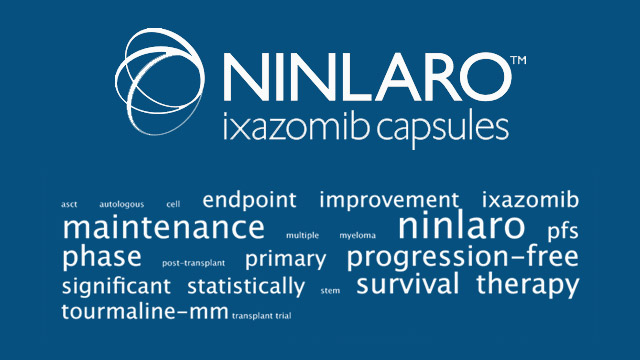Phase 3 Trial of NINLARO® (ixazomib) as Maintenance Therapy Met Primary Endpoint Demonstrating Statistically Significant Improvement in Progression-Free Survival in Patients with Multiple Myeloma Post-Transplant
Takeda Pharmaceutical Company Limited announced that the randomized Phase 3 TOURMALINE-MM3 study met its primary endpoint, demonstrating single-agent oral Ninlaro (ixazomib) as a maintenance therapy autologous stem cell transplant (ASCT) resulted in a statistically significant improvement in progression-free survival (PFS) versus placebo. The safety profile of NINLARO in the maintenance setting is consistent with previously reported results of single-agent NINLARO use.
The TOURMALINE-MM3 (NCT02181413) study is a randomized, placebo-controlled, double-blind Phase 3 study of 656 patients. The study was designed to determine the effect of NINLARO® (ixazomib) maintenance therapy on progression-free survival (PFS), compared to placebo, in participants with multiple myeloma who have had a response (complete response [CR], very good partial response [VGPR], or partial response [PR]) to induction therapy followed by high-dose therapy (HDT) and autologous stem cell transplant (ASCT). The primary endpoint is progression-free survival (PFS). A key secondary endpoint includes overall survival (OS). For additional information: https://www.clinicaltrials.gov/ct2/show/NCT02181413.
The trial evaluated the effect of Ninlaro as a maintenance therapy in adult patients diagnosed with multiple myeloma who responded to high-dose therapy and autologous stem cell transplant (ASCT). Takeda plans to submit data from the trial to regulatory agencies around the world. Ninlaro currently is not approved as a maintenance therapy for multiple myeloma following ASCT.
“Within the maintenance setting, it is critical that we find agents that are efficacious, tolerable, and convenient,” said Jesús Gomez Navarro, M.D., vice president, head of Oncology Clinical Research and Development at Takeda. “The results of the TOURMALINE-MM3 trial represent an important step toward the goal of expanding the use of Ninlaro as a maintenance therapy. This is the first and only Phase 3 placebo-controlled study evaluating a proteasome inhibitor in this setting and we look forward to discussions with Health Authorities around the world.”
There were no new safety signals found in TOURMALINE-MM3. The safety profile of Ninlaro in the maintenance setting is consistent with previously reported results of single-agent Ninlaro use.
Full data results will be submitted for presentation at the 60th American Society of Hematology Annual Meeting in December.

